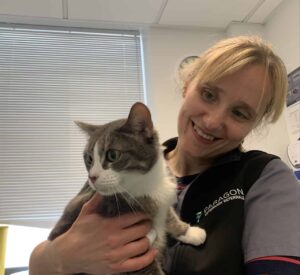Whiskers gets the cream after treatment for life-threatening condition
Meet Whiskers, who was referred to our internal medicine team after falling acutely unwell after a previous diagnosis of diabetes.
Advanced Practitioner in Small Animal Medicine, Jane Scott, led the care for Whiskers, who had collapsed and was unresponsive.
Whiskers underwent blood tests, which revealed high blood glucose, low electrolytes and phosphorous, and a urine test revealing ketones. The results confirmed diabetic ketosis, an unfortunate and life-threatening complication of diabetes due to the breakdown of body fat.
Hospitalised for treatment
Whiskers was hospitalised in our intensive care unit, receiving intensive intravenous fluid therapy to correct her dehydration and electrolyte abnormalities. She was also given insulin to stop the formation of other ketones, and a blood glucose monitor was placed under the skin to monitor her glucose levels.
After 24 hours, Whiskers had become severely anaemic, requiring a blood transfusion. A feeding tube was placed to assist with her feeding.
After seven days in our intensive care unit, we were delighted that Whiskers became well enough to be discharged. A check-up the following week confirmed her anaemia had resolved.
Ongoing care
Whiskers now receives regular insulin injections and has a special diet to control her blood sugar levels.
If you have a diabetic pet that becomes lethargic, stops eating or starts vomiting, please take them to see a vet as soon as possible, as early diagnosis is key.
Here at Paragon, we are fortunate to have the expertise and equipment to manage such critically ill patients, and we are so pleased that Whiskers continues to make good progress.

